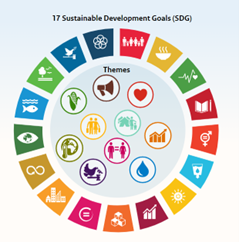Sustainability

Private business “work to generate profits and return value to shareholders, but the best-run companies do more. They put the customer first and invest in their employees and communities. In the end, it’s the most promising way to build long-term value”
Business Roundtable redefines the purpose of a corporation to promote “an economy that serves all Americans
What is sustainability and why is it important for business?
In simple words, sustainability of a business is organizing its activities in such a way as to best meet the needs of the current generation, without limiting the ability of future generations to use natural resources. Given this, the sustainability of a business is determined by its environmental, social and economic impacts on society in the short, medium and long term.
The introduction of the ideology of sustainability in the behaviour and activities of business creates a favourable environment for its development:
- sets a basis for attracting qualified and motivated human resources
- reduces political and social risks in its activities, including those related to climate change
- guarantees access to natural resources in the long run
- promotes innovation of goods and services.
In addition, the sustainable behaviour of business has a positive effect on its reputation and, accordingly, expands the range of consumers of its goods/services, provides for competitive advantages for business, expands the range of companies interested in joining its supply chain.

The incorporation of sustainability into business strategies of companies and their business processes is primarily aimed at achieving socially significant goals, such as improving the quality of people's lives, preserving the environment etc. Additionally, it provides business with certain competitive advantages being able to meet customers’ needs and create the basis for its successful development. Such advantages include:
- protecting company’s reputation and brand, creating a ground for early identifying risks and avoiding high-profile industry scandals
- providing for opportunities for building strong and long-lasting relationships with suppliers and customers
- strengthening competitive advantages and expanding a range of customers
- creating a basis for establishing partnership relationships with public authorities on central and local level
- developing innovative capacities of personnel and increasing profitability of business
- assisting in the reaching entirely new market’s segments
- creating conditions for a talent acquisition & development.
UN Global Compact recognise sustainability as “a weapon in the war on talent”, explaining this that “talented future leaders critically evaluate companies where they want to work, they are interested in what company do in above and beyond just creating value for stakeholders”.
SDG AMBITION GUIDE: Setting Goals for the Decade of Action - UN GLOBAL COMPACT

Our Experience in field of Sustainability:
Author's methodology for incorporating sustainability into business strategies and business models
Experience in the development of the UNECE People First PPP and the use this model for infrastructure modernization
Development and implementation of mechanisms for achieving sustainability of business (sustainable procurements, Codes of Conduct, Communication Strategies, Sustainability Reporting, etc.)
Research on sustainability issues at the request of international organizations
On-line Educational programs on sustainable development
Scientific and analytical publications in the field of sustainable development

The approval of the SDGs necessitated the development of a new global economic model that will work on the basis of sustainable development. "Under this model, business must go beyond 'normal behaviour' and begin to build it activity on new, more progressive ideas and principles, trying to work for society as a whole, not just for the 'privileged few.' In this new model, all actors (civil society, business, governments, etc.) shall work together to achieve a more humane economy in which everyone is equally valued; where companies take care of their employees, the community and the planet at the same level as their shareholders and board members.”
- publication date March 25, 2024
- author Iryna Zapatrina, Anna Shatkovska
- publication date August 10, 2022
- author Iryna Zapatrina
- publication date December 31, 2021
- author Iryna Zapatrina, Anna Shatkovska, Marina Marianovych
- publication date December 10, 2018
- author Irina Zapatrina
- publication date January 15, 2016
- author Irina Zapatrina
